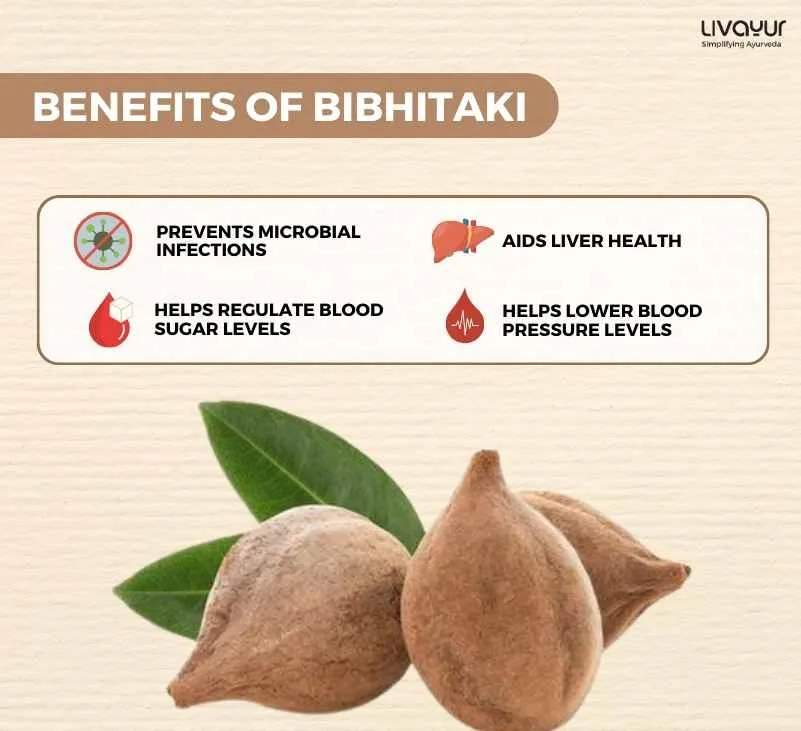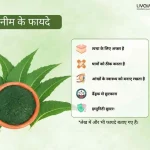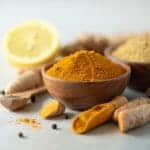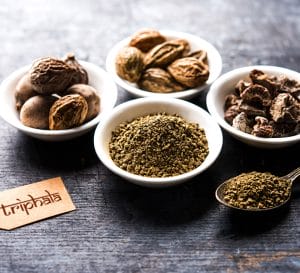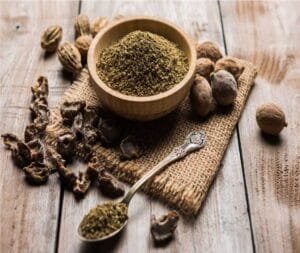For centuries, Bibhitaki fruit (Baheda in Sanskrit, Terminalia bellirica in scientific terms,) has been revered in Ayurvedic medicine for its diverse health benefits. Bibhitaki benefits are many, this small, wrinkled fruit, found in the foothills of the Himalayas, is packed with powerful antioxidants, vitamins, minerals, and other bioactive compounds that offer a wealth of benefits that are listed below.
Many Benefits of Bibhitaki
1. Digestive Powerhouse:
Bibhitaki is a natural laxative, aiding digestion and relieving constipation, bloating, and gas. Its astringent properties help regulate intestinal movement, while its anti-inflammatory effects soothe the gut lining. Studies have also shown its effectiveness in treating peptic ulcers and gastrointestinal distress. [1] [2]
2. Respiratory Relief:
Bibhitaki’s uses are many. Its anti-congestive and expectorant properties make it a potent ally against respiratory issues. It helps clear mucus from the lungs, alleviating coughs, asthma, and bronchitis symptoms. Its antimicrobial and anti-inflammatory properties further combat respiratory infections. [2]
3. Metabolic Marvel:
Bibhitaki’s benefits are immense. Itdemonstrates promising potential in managing diabetes. Its antioxidant activity helps regulate blood sugar levels and improve insulin sensitivity. [3] Research also suggests its role in lowering cholesterol levels and promoting healthy lipid metabolism.
4. Immune System Booster:
Bibhitaki’s rich blend of antioxidants and immune-modulatory compounds strengthens the body’s defense system. It stimulates the production of white blood cells and enhances their activity against pathogens, protecting the body from infections and illnesses. [1]
5. Antioxidant Powerhouse:
Bibhitaki plantis brimming with antioxidants like ellagic acid, tannins, and flavonoids. These potent antioxidants combat free radicals, protecting cells from damage and reducing the risk of chronic diseases like cancer, heart disease, and neurodegenerative disorders. [3]
6. Promotes Hair Health:
Bibhitaki plant has nourishing properties that promote hair growth and prevent dandruff and hair loss.[1]
7. Blocks cataracts [4]
The herbal combination of Triphala blocks the progression and intensity of selenite-induced cataracts.
Therapeutic Uses of Bibhitaki: [2]
- Triphala: Bibhitaki forms a key part of Triphala, a revered Ayurvedic formulation combining it with Amalaki and Haritaki. Triphala’s synergistic action amplifies the therapeutic benefits of each fruit, making it a powerful remedy for various ailments. [4]
- Powder: Finely powdered Bibhitaki can be taken orally with honey or warm water for its digestive and respiratory benefits.
- Tablets and Capsules: Bibhitaki plant is also available in convenient tablet and capsule forms for easy consumption.
How to Use Bibhitaki: [2]
Dosage:
The recommended dosage of Bibhitaki powder is 3-6 grams per day. For cough, cold and throat problems, it is taken with honey.
However, it’s best to consult an Ayurvedic practitioner for personalized advice based on your specific needs and health condition.
Precautions:
Pregnant and breastfeeding women should avoid consuming Bibhitaki powder or other variants without consulting a healthcare professional, due to limited research in this area. Additionally, individuals with certain medical conditions like diabetes or hypoglycemia, should approach it cautiously and continuously monitor their blood sugar levels.
Conclusion:
Bibhitaki plantis a remarkable natural treasure trove of health benefits. From aiding digestion and boosting immunity to promoting respiratory health and skin health, this humble fruit offers a wealth of therapeutic potential. By incorporating Bibhitaki into your diet or using it in its various forms, you can unlock its power to enhance your overall well-being and embrace a healthier, more vibrant life.
Disclaimer
This article is from a health and wellness perspective only and does not constitute medical advice. Kindly seek the help of a trained medical practitioner before initiating any treatment.
FAQs
1. Is Bibhitaki plant safe for everyone?
While Bibhitaki is generally safe for most individuals, it’s best to consult a healthcare professional before consuming it, especially if you are pregnant, breastfeeding, or have any existing health conditions.
2. What is the best way to consume Bibhitaki?
The most effective way to consume Bibhitaki depends on your specific needs. Powdered Bibhitaki with honey or warm water is beneficial for digestion and respiratory issues. A decoction can be used for sore throats or skin conditions. Tablets and capsules offer convenience for daily consumption.
3. Can Bibhitaki interact with medications?
While not common, Bibhitaki might interact with certain medications, particularly hypoglycemic drugs. Consult your doctor before taking Bibhitaki if you are on any medication.
4. Are there any side effects of Bibhitaki?
Excessive consumption of Bibhitaki can cause diarrhea or stomach upset. Start with low doses and gradually increase as tolerated.
5. Where can I find Bibhitaki?
Bibhitaki is readily available in many online retailers and Ayurvedic stores. You can find it in various forms, including powder, decoction, tablets, and capsules.
References:
- Evaluation of the Antipyretic and Anti-Inflammatory Potential of Aqueous Fruit Pulp Extract of Terminalia bellirica
- PHYTOCHEMICAL ANALYSIS AND INVESTIGATION OF ANTI-INFLAMMATORY AND ANTI-ULCER ACTIVITY OF TERMINALIA BELLIRICA LEAVES EXTRACT
- Antidiabetic and antioxidant activity of Terminalia belerica. Roxb
- Current Trends in the Pharmacotherapy of Cataracts




